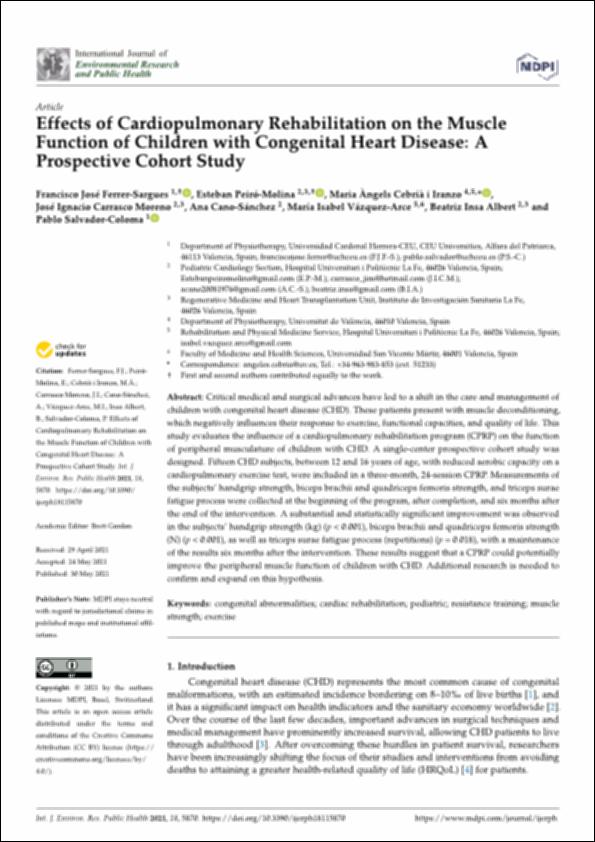Please use this identifier to cite or link to this item:
http://hdl.handle.net/10637/13661Effects of cardiopulmonary rehabilitation on the muscle function of children with Congenital Heart Disease : a prospective cohort study
| Title: | Effects of cardiopulmonary rehabilitation on the muscle function of children with Congenital Heart Disease : a prospective cohort study |
| Authors : | Ferrer Sargues, Francisco José Peiró Molina, Esteban Cebrià i Iranzo, Maria Àngels Carrasco Moreno, José Ignacio Cano Sánchez, Ana Vázquez Arce, Isabel Insa Albert, Beatriz Salvador Coloma, Pablo |
| Keywords: | Exercise - Therapeutic use.; Músculos - Fuerza - Entrenamiento.; Muscles - Training.; Educación física para niños.; Heart - Abnormalities - Treatment.; Physical education and training for children.; Ejercicio físico - Uso terapéutico.; Children - Abnormalities - Treatment.; Corazón - Anomalías y malformaciones - Tratamiento.; Anomalías y malformaciones en los niños - Tratamiento. |
| Publisher: | MDPI |
| Citation: | Ferrer-Sargues, F.J., Peiró-Molina, E., Cebrià i Iranzo, M.À., Carrasco Moreno, J.I., Cano-Sánchez, A., Vázquez-Arce, M.I., Insa Albert, B., & Salvador-Coloma, P. (2021). Effects of cardiopulmonary rehabilitation on the muscle function of children with congenital heart disease: a prospective cohort study. International Journal of Environmental Research and Public Health, vol. 18, i. 11 (30 may.), art. 5870. DOI: https://doi.org/10.3390/ijerph18115870 |
| Abstract: | Critical medical and surgical advances have led to a shift in the care and management of children with congenital heart disease (CHD). These patients present with muscle deconditioning, which negatively influences their response to exercise, functional capacities, and quality of life. This study evaluates the influence of a cardiopulmonary rehabilitation program (CPRP) on the function of peripheral musculature of children with CHD. A single-center prospective cohort study was designed. Fifteen CHD subjects, between 12 and 16 years of age, with reduced aerobic capacity on a cardiopulmonary exercise test, were included in a three-month, 24-session CPRP. Measurements of the subjects’ handgrip strength, biceps brachii and quadriceps femoris strength, and triceps surae fatigue process were collected at the beginning of the program, after completion, and six months after the end of the intervention. A substantial and statistically significant improvement was observed in the subjects’ handgrip strength (kg) (p < 0.001), biceps brachii and quadriceps femoris strength (N) (p < 0.001), as well as triceps surae fatigue process (repetitions) (p = 0.018), with a maintenance of the results six months after the intervention. These results suggest that a CPRP could potentially improve the peripheral muscle function of children with CHD. Additional research is needed to confirm and expand on this hypothesis. |
| Description: | Este artículo se encuentra disponible en la siguiente URL: https://www.mdpi.com/1660-4601/18/11/5870 Este artículo pertenece al número especial "The Prescription of Exercise to Improve Cardiovascular Health". |
| URI: | http://hdl.handle.net/10637/13661 |
| Rights : | http://creativecommons.org/licenses/by/4.0/deed.es |
| ISSN: | 1660-4601 (Electrónico) |
| Issue Date: | 30-May-2021 |
| Center : | Universidad Cardenal Herrera-CEU |
| Appears in Collections: | Dpto. Enfermería y Fisioterapia |
Items in DSpace are protected by copyright, with all rights reserved, unless otherwise indicated.


